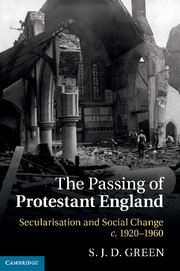Book contents
- Frontmatter
- Contents
- Acknowledgements
- Part I Outline of the problem
- Part II Disclosures of decline
- 3 The ‘soul of England’ in an ‘age of disintegration’: Dean Inge and the ‘trial of the churches’ in the wake of World War I
- 4 The strange death of puritan England
- 5 Social science and the discovery of a ‘post-protestant people’: Rowntree's surveys of York and their other legacy
- Part III Resistance, revival and resignation
- Conclusion: the passing of protestant England
- Index
- References
4 - The strange death of puritan England
Published online by Cambridge University Press: 10 January 2011
- Frontmatter
- Contents
- Acknowledgements
- Part I Outline of the problem
- Part II Disclosures of decline
- 3 The ‘soul of England’ in an ‘age of disintegration’: Dean Inge and the ‘trial of the churches’ in the wake of World War I
- 4 The strange death of puritan England
- 5 Social science and the discovery of a ‘post-protestant people’: Rowntree's surveys of York and their other legacy
- Part III Resistance, revival and resignation
- Conclusion: the passing of protestant England
- Index
- References
Summary
In 1935, at the very height of the Abyssinian crisis, as diplomatic relations between His Majesty's government and Mussolini's dictatorship soured and talk of League of Nations sanctions against Il Duce's regime charged the international atmosphere, an imaginative Italian journalist called upon his fellow countrymen to come to the defence of their brave, new, Roman Empire – simultaneously to take a principled, if Mediterranean, stand against ‘perfidious Albion’ – by collectively desisting forthwith from all such ‘pernicious British habits as tea-drinking, snobbery, golf-playing, Puritanism, clean-shaving, pipe-smoking, bridge-playing and that inexplicable apathy towards women’ which so characterised the Anglo-Saxon male. Whether even that much collective ‘self-denial’ would have been sufficient to ensure Italy's claim to great power status through the middle of the twentieth century may be doubted. That it described what were then widespread continental views concerning the peculiar moral character of Italy's newly intransigent foe need not be questioned. In fact, many in interwar Britain would happily have acknowledged this description, though scarcely the implied normative judgement, of long-standing indigenous attitudes. Yet just eight years later, with the allies on the verge of (comparatively) easy victory over what had (unexpectedly) proved to be the weakest of the axis powers, Archbishop William Temple, Primate of All England, outlined a very different, albeit equally unflattering, portrait of the ethical standing of his compatriots. These Britons – men again, for the most part – were no longer misogynistic, in any case celibate, killjoys.
- Type
- Chapter
- Information
- The Passing of Protestant EnglandSecularisation and Social Change, c.1920–1960, pp. 135 - 179Publisher: Cambridge University PressPrint publication year: 2010



